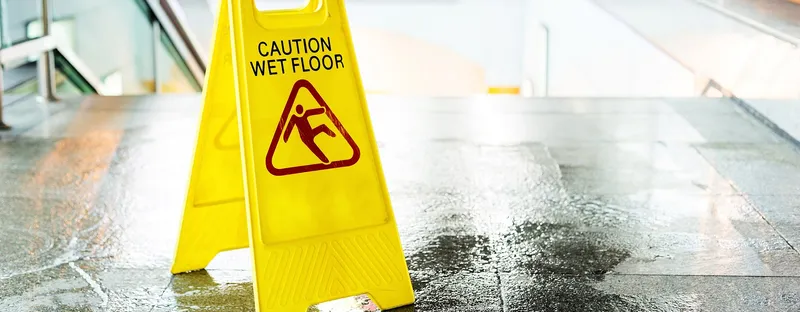A slip-and-fall liability claim is a type of personal injury claim based on negligence. Broadly speaking, negligence refers to a situation where someone’s carelessness or purposeful actions harmed you.
In a slip-and-fall case, someone else’s (like a property owner’s) carelessness created a hazardous environment, resulting in you slipping and falling.
What Do I Need to Prove to Win My Slip-and-Fall Lawsuit?
To win your slip-and-fall injury case, you need to prove the following:
- Duty of care,
- Breach of duty,
- Causation, and
- Injury.
To prove a slip and fall liability claim, you must show that these factors “more likely than not” were at play at the time of the slip and fall.
Let’s talk about the four factors in a slip-and-fall negligence case.
Duty of Care
To win your slip-and-fall injury case, you’ll need to prove that the responsible party owed you a duty of care.
As a general matter, everyone owes everyone else some level of a duty of care to act reasonably under the circumstances, as a prudent person would. When it comes to slip-and-fall cases, you must show that the other party owed you a duty of care while you were on their property.
Whether they owed you a duty of care, and what that duty is, depends in large part on:
- The type of premises,
- The circumstances leading to the accident;
- The justification for the condition of the property; and
- The reason you were on the premises.
This particular area of law can be complex, so it’s important to talk to a knowledgeable attorney about your circumstances. Our slip-and-fall injury lawyers have decades of experience helping people like you. We can help you understand and preserve your legal rights.
Breach of Duty
Slip-and-fall victims must prove that the other party breached their duty—that they failed to act as a reasonably prudent person would under the circumstances.
Examples of a breach of duty in a slip-and-fall case include:
- Failing to properly maintain the stairs leading into the building;
- Not putting up “Wet Floor” signs; and
- Leaving debris in the main walkway.
An attorney can help you gather the evidence you need to prove that the at-fault party did not act reasonably under the circumstances.
Causation
Next, you’ll need to show that there is a causal connection between the other party’s breach of duty and the resulting injury. Put another way, you must show that it’s likely that the injury or accident wouldn’t have occurred if they had acted differently.
Notice
In California, it is required that the property owner be on notice of the dangerous condition before they have a responsibility to fix it.
However, to prove notice, it is not necessary that the property owner actually knows about the condition. If they created the condition, that counts as notice.
Also, if they should have known about it through reasonable inspection, it can also be determined that they had notice.
Injury
You must prove that you suffered an actual, provable injury because of the other party’s actions. You also must prove the monetary value of your damages.
What Do I Do If My Slip-and-Fall Claim Is Denied?
Slip-and-fall cases aren’t necessarily over if the insurance company or court denies the claim. Even if your slip-and-fall claim is denied, you may be able to appeal that decision. Our California slip-and-fall injury attorneys can review your slip-and-fall lawsuit to assess your options.
California Injury Lawyers Can Help You – Get a Free Consultation
Since 1984, Wells Call Injury Lawyers has recovered over half a billion (that’s “billion” with a “b”) dollars for our personal injury clients.
Unlike the competition, we have actual offices in the areas we serve. We truly care about our slip-and-fall clients, fighting for them to get the best settlement available.
Call us or contact us online today, so we can help you.

